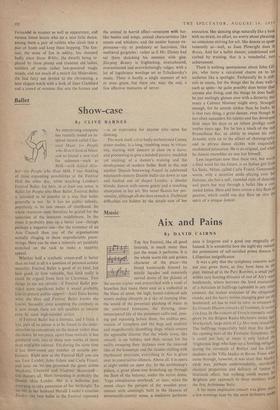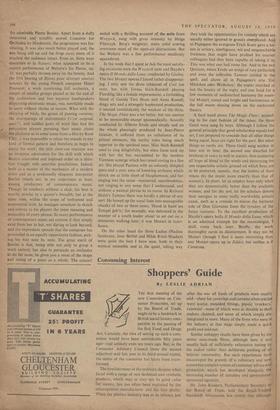Music
Aix and Pains
By DAVID CAIRNS
THE Aix Festival, like all good festivals, is much more than just the music it performs. It is the whole warm life and golden character of the place—the broad boulevards fronted by stately facades and massively carved doors of the p'alaces of the ancien regime and overarched with a vault of branches that make them cool as a cathedral in the blaze of noon, the high, honey-coloured side streets ending abruptly in a sky of burning blue, the sound of the .perpetual plashing of water in the courtyard fountains, the thriving, time- emancipated life of the pavement cafés and, pass- ing and repassing before them, the endless pro- cession of nymphets and old bags and students and magnificently shambling dogs, which creates the agreeable illusion that the whole town, like oneself, is on holiday and that, except for the swifts sweeping their skylanes over the rose-red tiles of the housetops and the cicadas sizzling with rhythmical precision, everything in Aix is given over to constructive idleness. Above all, it is opera at night under an open sky. In the archbishop's palace, a great plane-tree branching up through the floor of the balcony, under the velvet dome, 'Vega conspicuous overhead,' or later, when the moon clears the parapet of the wooden pros- cenium arch cunningly built in the likeness of seventeenth-century stone, a mediocre perform- ance is forgiven and a good one magically en' hanced. It is wonderful how the night sky reduce the pretensions of self-satisfied prima donnas to Lilliputian insignificance.
It was a pity that the symphony concerts were not also given there, as they have been in the past, instead of in the Parc Rambot, a small pad' within easy hooting distance of one of Aix's male boulevards, where between the lewd eructations of a battalion bf bullfrogs (splendid in any other context), the tireless eroticism of the ubiquitous cicada, and the heavy lorries changing gear on the boulevard, art has to wait its turn; as someone le La Grande Illusion remarks of frontiers, la natuti s'en font. In the concert of French romantic music given by the Belgian Radio Orchestra under Igor Markevitch, large parts of La Mer were inaudible' The bullfrogs respectfully held their fire during the opening bars of the Fantastic Symphony, hill it could not last; at times it only lacked the `frightened dogs who kept up a howling obligati during the carousals of Berlioz and his fello0 students at the Villa Medici in Rome. From what came through, however, it was clear that Marker vitch was, perhaps understandably, sacrificing classical proportion and delicacy of timbre to ) histrionic effect; but nothing could excuse his I Brighton pier approach to three numbers frote the first Arldsienne Suite.
A far more impiessive concert was given there a few evenings later by the same orchestra uncle. the admirable Pierre Boulez. Apart from a dully conceived and scruflily scored Concerto for Orchestra by Hindemith, the programme was fas- cinating. It was also much better played and, the sun being still up and the frogs facet, more of it reached the audience intact. Even so, there were casualties to la Nature; what appeared to be a superb performance of Webern's Six Pieces, op. 10, was partially thrown away on the breeze. And the first hearing of !Glues pour diverses sources senores by the young French composer Henri Pousseur, a work combining full orchestra, a couple of smaller groups placed at the far end of the auditorium and two separate loudspeakers dispensing electronic music, was inevitably made to seem without rhyme or reason. What with the chirping of birds, the groan of passing cautions, the murmurings of malcontents (Vest original. quoit''), and sudden guSts of wind that had the percussion players pursuing their music about the platform as in some scene from a film by Ren Clair, it was impossible to relate the sounds to any kind of formal pattern and therefore to begin to assess the work; the only clear-cut reaction was an immense admiration for the skill with which Boulez controlled and imposed order on a situa- tion fraught with anarchic possibilities. Indeed, both as a master of the mechanics of a modern score and as a profoundly eloquent interpreter Boulez stands out, in my experience at least, among conductors of contemporary music. Though he conducts without a stick, his beat is exactly precise to a quaver's breadth; but at the same time, within the scope of restrained and economical style, he manages somehow to sketch and convey to his players the inner meaning and musicality of every phrase. So many performances of contemporary music are content if they simply exist from bar to bar, not daring to look beyond, and the impression spreads that the composer has proceeded in an equally opportunist fashion, pick- ing his way note by note. The great merit of Boulez is that, being able not only to grasp a work entirely but also to persuade an orchestra to do the same, he gives you a sense of the shape and sweep of a piece as a whole. The concert ended with a thrilling account of the suite from Wozzeck, sung with great intensity by Helga Pilarczyk. Berg's weightier, more solid scoring overcame most of the open-air distractions. But the Webern was a fine performance needlessly squandered.
In the week that I spent in Aix the most satisfy- ing occasions were the Wozzeck suite and Haydn's opera 1/ Mondo della Luna, conducted by Giulini. The two Mozart operas I found rather disappoint- ing. I only saw the dress rehearsal of Cosi fan tulle, but with Teresa Stich-Randall playing Fiordiligi like a female impersonator, a forbidding blend of Goody Two Shoes and Anna Russell, dingy sets and a strangely haphazard production, it seemed unmistakably the weakest of the three. The Magic Flute was a lot better, but too uneven to be memorable except spasmodically. Soundly conducted by Alberto Erede and simply and on the whole pleasingly produced by Jean-Pierre Grenier, it suffered from an unbalance of its primal elements, the earthy roles being much superior to the spiritual ones. Miss Stich-Randall used to sing delightfully, but since fame took up with her she has succumbed to the modern Viennese scourge which has raised cooing to a fine art. She played Pamina with an odiously dimpled piety and a cosy aura of knowing archness which struck me as little short of blasphemous, and her singing was the same—mannered, sanctimonious, not singing in any sense that I understand, and without a natural phrase to its name. In Richard Holm's Tamino there was hardly a phrase of any sort. He hewed up the vocal lines into manageable chunks of two or three notes. 'Hand in hand ins Tempel geh'n,' for example, was delivered in the manner of a youth leader about to set out on a strenuous walking tour; it was Mozart in leder- hosen.
On the other hand the three Ladies (Nadine Santereau, Jane Berbi6 and Hilde Rossl-Majdan) were quite the best 1 have seen, both in their musical ensemble and in the quiet, telling way they took the opportunities for comedy which are usually either ignored or grossly overplayed. And as Papageno the evergreen Erich Kunz gave a les- son in artistry, intelligence, wit and unquenchable freshness that might have profited his coarser colleagues had they been capable of taking it in. This was what one had come for. And'in the two Quintets, where Erede set tempi of rare perfection and even the inflexible Tamino yielded to the spell, and above all in Papageno's aria `Ein Madchen oder Weibchen,' the music matched at last the beauty of the night, and one lived for a few moments of undisturbed harmony the essen- tial Mozart, round and bright and harmonious as the full moon shining down on the enchanted theatre.
A final word about The Magic Flute: accord- ing to the cant fashion of the times, the three Genii were sung by boys. Although 1 follow the general principle that good scholarship equals bad art, I am prepared to concede that all other things being equal, boys are right for the part. But other things so rarely are. These Genii sang neither in tune nor in time; the second one dwarfed his brethren in voice as well as stature, thus scattering all hope of blend to the winds and destroying the one respectable artistic ground on which boys are to be preferred, namely, that the timbre of their voices fits the music more exactly than that of women's. In short, let us employ boys only when they are demonstrably better than the available women; and for the rest, let the scholars devote their energies to some really worthwhile artistic cause, such as a crusade to rescue the baritone role of Don Giovanni from the tyranny of the basso cantante. To the excellent production of Haydn's opera buffa 11 Mondo della Luna, which is an admitted triumph for the musicologist, I shall come back later. Briefly, the work thoroughly earns its disinterment. It may not be Mozart (though I find it more interesting than any Mozart opera up to Zuide), but neither is it Cimarosa.



































 Previous page
Previous page